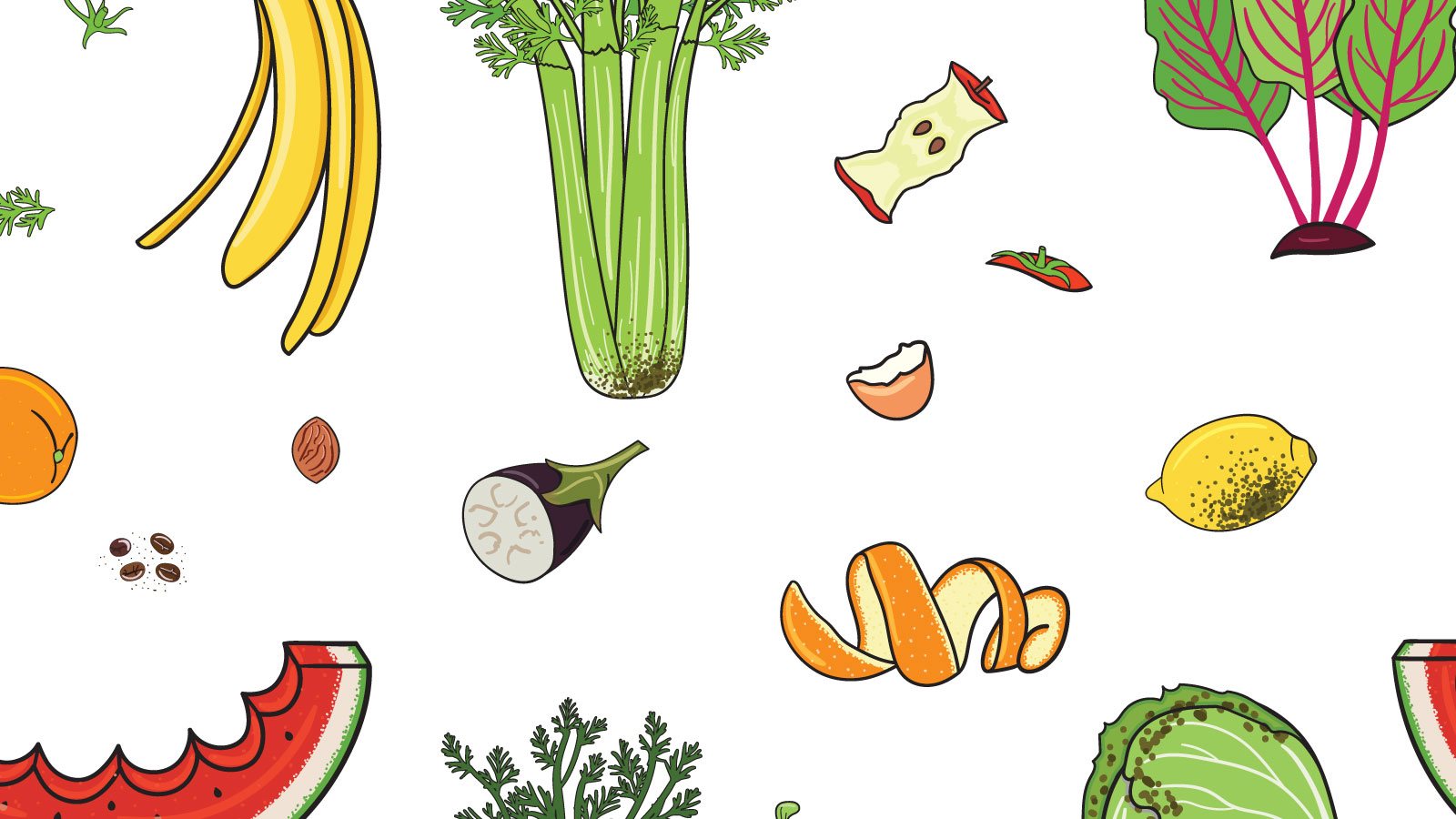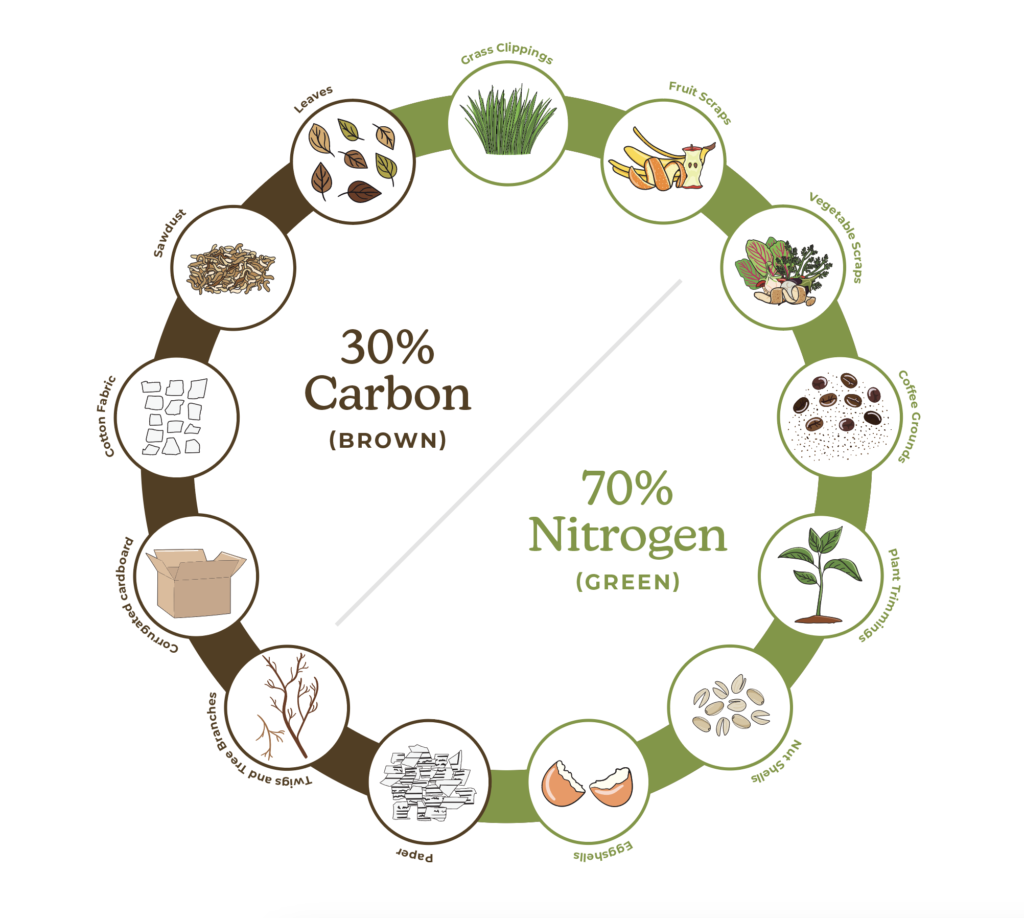It’s Easy Being Green (& Brown!)
- This story originally appeared in the July 2024 "City" issue of COMO Magazine

Getting comfortable with backyard composting.
You are a responsible environmental citizen. You turn your thermostat up in summer and down in winter, and if your server offers a plastic straw, you politely decline. When Columbia resumed curbside recycling, you wanted to declare a citywide holiday. Still, you can’t shake the feeling you could be doing something more for Mother Earth — and you’re right. That something is residential composting.
According to the U.S. Environmental Protection Agency, food makes up 24 percent of the country’s solid municipal waste, better known as “garbage.” When that organic material breaks down in anaerobic (oxygen-absent) conditions, the result is methane, a greenhouse gas twenty-eight times more powerful than carbon dioxide. Food waste accounts for 58 percent of landfill methane emissions in the U.S., so keeping it out of dumps is a great way to combat climate change.
Then there are the carbon emissions produced when garbage trucks schlep all that slop to a solid waste facility. Because of the water it contains, food waste is one of the heaviest components in the waste stream. That’s why even cities with residential curbside composting — or bioreactor landfills like Columbia’s — promote residential composting as the most sustainable choice.
Overcoming Composting Quibbles
Composting, huh? Maybe you’ve considered it, but it always seemed an eco-conscious bridge too far. Composting sounds like a lot of work, and besides, don’t backyard compost piles stink and attract pests?
Jody Cook heads up Columbia’s composting workshop program, and she’s heard these objections before. Luckily, she also knows how to avoid composting’s cons. If you’re familiar with the basics of composting, you’re aware it entails mixing “greens” (vegetable peelings, coffee grounds, grass clippings) with twice as many “browns” (dry leaves, wood chips, straw). Cook says the most crucial factor is “to create the environment for composting to occur; you do not want to rot food. So you have to have your brown medium, and you need to cover up the greens.”
Once you’ve employed this simple tactic, you’ll be surprised at how quickly odors are neutralized. Cook notes that if you turn a pile a few days after adding food scraps, you’ll still see them, but they will smell earthy instead of rotten. And that wards off potential pests.
A Composting Style for Everyone
Maybe you’re an avid gardener who wants to get in on that “black gold” action you’ve heard about — and spend less at the garden center. Or you can’t garden to save your life, but you’re willing to do the eco-friendly thing provided there is no stench involved. Whatever your objective, Cook is confident there is a composting style for you.
The Lazy Composter
Saving potato peels, watering your pile, turning it — just how labor-intensive is composting, anyhow? Self-described “lazy composter” Lisa Groshong says the answer is “not very.” She and husband Trevor Harris maintain a DIY two-bin setup in the corner of their backyard and give the active pile a moderate stir when they add food scraps. Every few months, the pile undergoes a full-scale turning.
Using this method, the finished compost doesn’t come quickly — the most recent batch took maybe six months. Meanwhile, though, the couple produces so little trash they don’t even take it out every week. With no food waste, there is no smell.
“Composting is so easy,” Groshong says. “You can make it complicated if you want to, but it doesn’t have to be complicated.”

The Green-Thumbed Scientist
While benign semi-neglect suits some composters, it’s not the method of choice for biochemistry professor–cum-horticulturalist Brenda Peculis. While Peculis had dabbled in composting as an apartment dweller, her efforts began in earnest when she bought her home in 2004. Confronted with a backyard that was largely “not very pretty grass, growing in dense clay,” she knew there was planting to be done, and she needed plenty of compost to do it.
Success was not immediate.
“For so many years, I just made kitchen slime,” Peculis laughs. “I mastered ‘rotting food.’” But with insights gained through the city’s workshop and other research — and the acquisition of a compost thermometer — she’s hit her composting stride. Today her well-honed system combines bokashi composting (which uses a specific mix of bacteria to ferment food scraps in a low-oxygen environment, giving them a faintly pickled odor) with a conventional outdoor compost bin. The acidic products of her bokashi bucket fire up her backyard bin so quickly that it yields finished compost in four to six weeks.
“It’s made gardening easy; it really has,” Peculis says. “I never buy dirt anymore.”
The Hemmed-In Homeowner
Among her early composting miscues, Peculis cites her initial attempt to use a composting tumbler.
“Composting works because of soil bacteria. As soon as you remove interaction with the soil, it doesn’t work,” the biochemist notes. But what if a tumbler is the only composting approach your homeowner association will allow? That’s the situation Kathryn Sharp Sapp faced, yet she and her tumbler have found composting success.
The reason is obvious when Sapp slides open the device’s lid. She’s added some garden dirt to her $80 tumbler, and its airholes allow insects to enter and lay their eggs. When the larvae hatch, they go to town on her family’s food scraps.
“Heads up that there’s gonna be some activity in there,” she says, “but they’re breaking things down.” Per Cook’s advice, Sapp controls odors by adding browns: mostly dry leaves stored in the free Geobin composting frame she received at a city workshop.
Sapp admits that what looks tidy to the neighbors is not as tidy for her, since emptying her tumbler means scooping it out manually. Luckily, she’s “not afraid to get dirty” when the payoff is visible waste reduction and a good-to-go batch of compost every three months.
Try It Already
When asked for their No. 1 tip for composting-curious but hesitant Columbians, these composters were unanimous: Just give it a go. The city’s composting workshops will provide the know-how — and a free Geobin composter besides. You will significantly reduce your trash output and make Mama Earth proud.

2024 Home Composting Workshops
Saturday, July 27
Garth Nature Area • 9-10 a.m.
Tuesday, August 13
Britt Hall Community Garden/Fire Station #8 • 6-7 p.m.
For more information, contact Jody Cook at [email protected] or 573-874-6271.
To schedule a Compost or Waste Reduction/Recycling Workshop specific to a group, contact Jody. (A minimum of eight attendees is required.)


